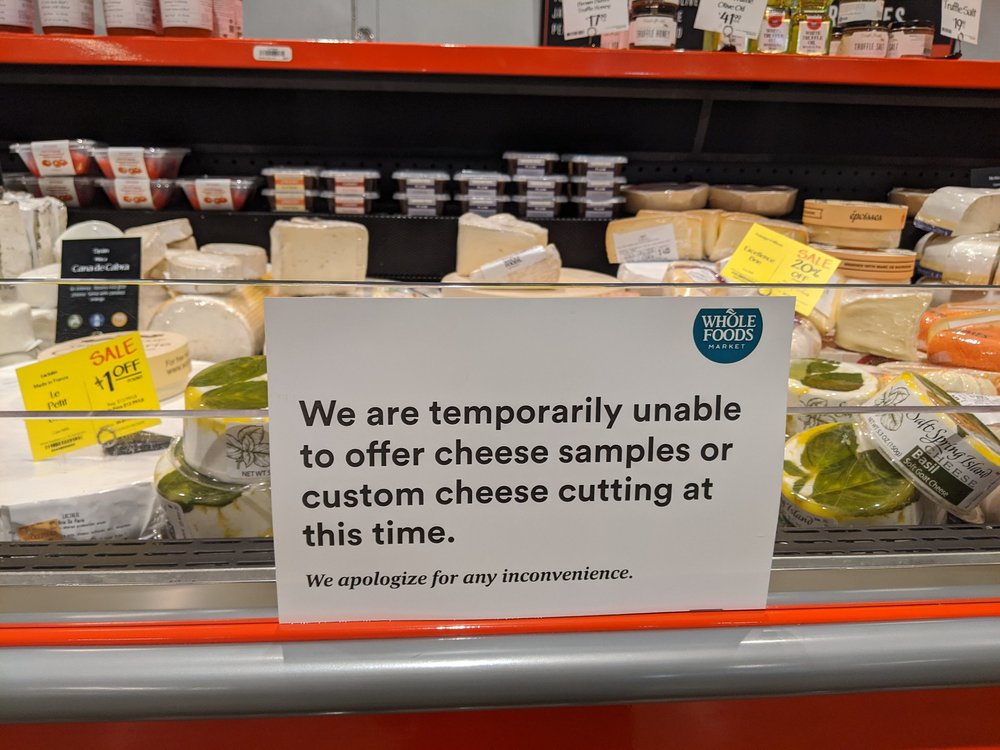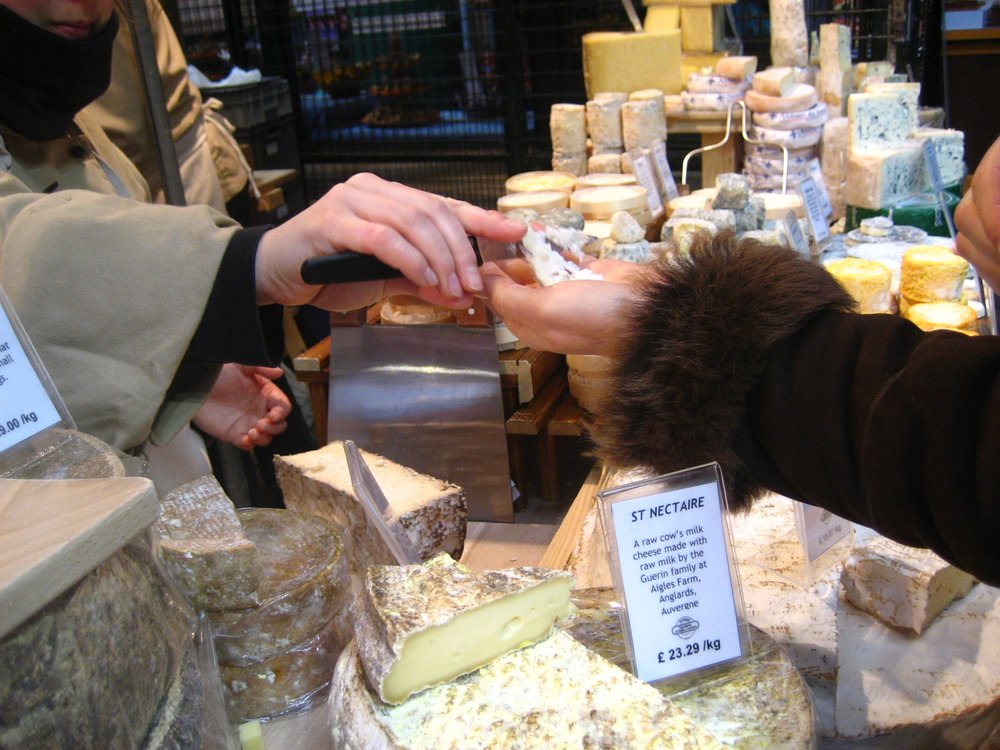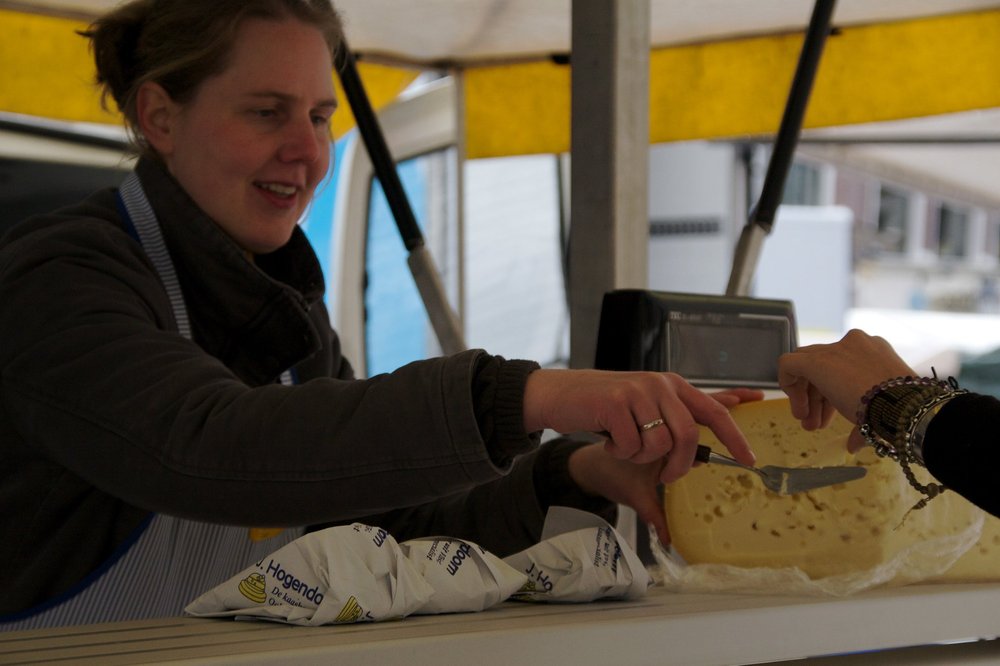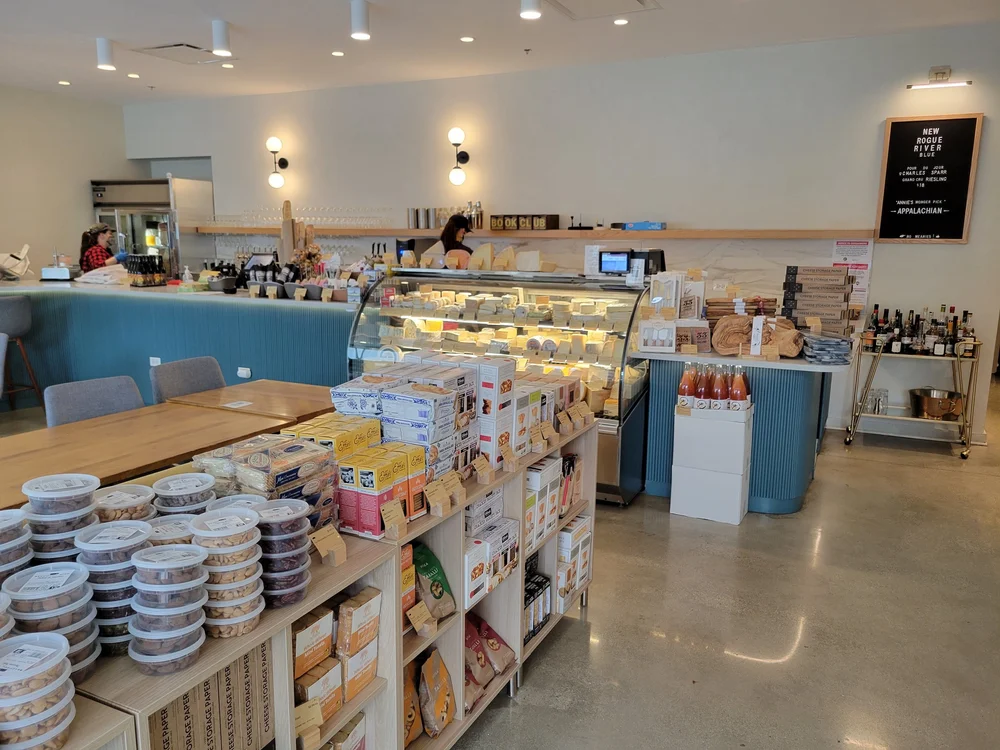Food retailers know that sampling products can increase sales and cheese is no exception. Sampling of rare or high-priced foods such as cheese, give customers the chance to fall in love with new products they might be less willing to buy otherwise. If sampling is done during busy times, it can help alleviate complains over long wait times at busy stores. For those behind the counter, sampling products creates an opportunity to better serve consumers and to establish a personal connection.
“No cheese sample signs, covid lockdown, Whole Foods, Burbank, California, USA” by gruntzooki is licensed under CC BY-SA 2.0.
When the pandemic started sampling at cheese counters stopped immediately. Now, as stores start to find a new way to navigate the new normal, many are asking “is sampling back?” We reached out to an array of independent stores, supermarkets, and producers around the world about their protocols for sampling and their current thinking about it.

Sampling in the UK
In the UK all restrictions have been lifted and masks are not required indoors. Svetlana Kukharchuk and Andy Swinscoe are slowing returning to sampling products. Svetlana’s store in Scotland is sampling in an ad-hoc basis only when customers are unsure about what to get. At The Cheese Lady store she has had “a couple of tasting sessions of alcohol products with producers/suppliers… and one involved cheese…”. She hopes to start putting out samples again for people to taste as they visit the store, but for the time being she is still being careful. Andy at the Courtyard Dairy is also being careful and mentioned that they are using “separate knives between cheeses and customers (lots of cleaning)”. Previously, he and his team gave each customer a board on which they placed samples, each customer “had a distinct board that they carried around with them and we sliced slivers for them to try”. This was done to limit cross contamination and was done in addition to separating people onto different parts of the store.
Cheese Sampling in France & Italy
In Paris, this spring I noticed that I was not offered samples at cheese stores and neither cheesemongers or customers were required to wear a masks indoors. In Italy things are a bit different. Roberto Guermandi head cheesemonger of the L’angolo della Freschezza in Bologna told us “I have no post-covid protocols, precisely because Italian food law is already very restrictive. All cheese is normally portioned and fresh cut to sale. We normally don’t sample products.” He also shared that his staff must wear masks until the end of month (June 2022). Elsewhere in Europe it would seem like mask wearing for employees is also ending, while sampling is not entirely back or has not been used as a method of sale.
Sampling in Latin America
Things in Latin America are a bit different. Pre-pandemic sampling was very common in Mexico and Colombia, where producers and large stores had relied on in-store demos to drive sales. Edisson Diaz from the supermarket chain Carulla in Colombia mentioned that “the Ministry of Health has not allowed open sampling to be used in stores, however stores can choose to give samples in close packaging and with informational labelling.” In Mexico, there is no sampling or demos in supermarkets, but vendors at cheese stalls in local mercados are giving out samples using gloves and toothpicks. Georgina Yescas of Lactography told us that she is also sampling products, but that many of her customers refuse them preferring to keep masked while shopping.
The Evolution of Sampling of Some Mexican Cheeses
While talking to Mexican cheese producer Rodolfo Navarro Aceves, we found out that cheese sampling has been transformed for his business. His company produces a selection of Mexican style cheeses in the state of Jalisco and distributes them in his region, Mexico City, and Monterrey in the north of the country. Since 2019, he also started selling in the United States at HEB in Texas and in forty-one Northgate Gonzalez Markets in California.
While samples are given out to customers who ask for them in the California stores, there is no sampling in store in Texas. Since before the pandemic Quesos Navarro has employed 60 demo-tasters. These demo-tasters are a common feature at Latin-American supermarkets and help in driving sales on the floor of crowded stores. Now that sampling is prohibited at stores, the women employed by Navarro have had to be retrained to explain cheese taste, textures, and uses in recipes without being able to sample product. This type of training is becoming more and more important, as many places around Latin-America have been eyed for expansion by European brands and denominations of origin. A handful of companies are developing training materials in Spanish and Portuguese, including Mexican Mongers and Savencia.
Sampling in Brazil
While travelling in Brazil, I also noticed that sampling in supermarkets and stores is not back and sampling in local markets is done in an ad-hoc basis. Independent stores in Sao Paulo and in Belo Horizonte are not sampling products. Marcia Barbosa Senas Araujo from Galeria do Queijo commented that she is seeing a need for packaging to change to allow customers to see product without opening pieces. Her store and many others in both cities have large displays with a lot of cheese on shelves to entice the customer to buy. In my visits to local farmers’ markets, cheese vendors were happy to give samples to people asking about specific products.
“cheese sample, gouda, netherlands” by chezrobyn is licensed under CC BY-NC-ND 2.0.
Sampling in Canada
It would seem like many people selling in open spaces are more comfortable giving samples. This is the case of Seanna Pyne who manages a cheese stall in two farmers’ markets in the Canadian province of Nova Scotia. At the Milk Street Cheese Company, she is giving out samples using toothpicks, but that is a recent change as the market’s rules weren’t allowing open sampling up to last month (May 2022).
Sampling in the US
While researching for this piece, I got really intrigued about what some of the stores in the United States that used to rely heavily on sampling were doing. I reached out to my friends in Ann Arbor, and they responded that Zingerman’s Deli is “actively sampling products to our guests, following all health code rules as we did pre-covid.”
Linsdey Schechter in Houston wrote “the tastings are the best part of visiting Houston Dairymaids. We’ve changed the format due to COVID. We no longer use a communal plate to cut samples from. Instead, we present each guest with their own very small, eco-friendly disposable plate with five samples and a toothpick. We then guide them through the sampling.” This sounds like a fun experience and an excellent way to introduce people to new products and re-introduce the classics.

Finally, Randall Felts at Beautiful Rind in Chicago shared that they “don’t do any over-the-counter sampling at the moment. Chicago’s Covid guidelines for a long time restricted any consumption of food while standing (mainly targeting bars but it was a universal rule).” He thinks that not sampling has helped his staff stay safe. His store opened just before the start of the pandemic, which has been a unique experience. To make up for the lack of sampling, his store has a policy of “refunds if they don’t like a particular cheese.” They are sure to remind customers when serving them, while also encouraging them to take one of their classes on cheese vocabulary. He is also constantly training staff to ensure they feel confident when talking about cheeses without being able to sample them.
Looking Forward
The reality is that there is not clear information from health departments around the world about sampling products. Even before the pandemic, many regulators turned a blind eye to the practice and only addressed it when issues surfaced. Retailers and producers understand that not one regulation can apply to everyone and that there are real considerations overall cleanliness, time of exposure of samples, and cross contamination. As we establish a new normal it is important to consider people’s boundaries over mask wearing, food handling, and close contact with cheesemongers and sellers.
